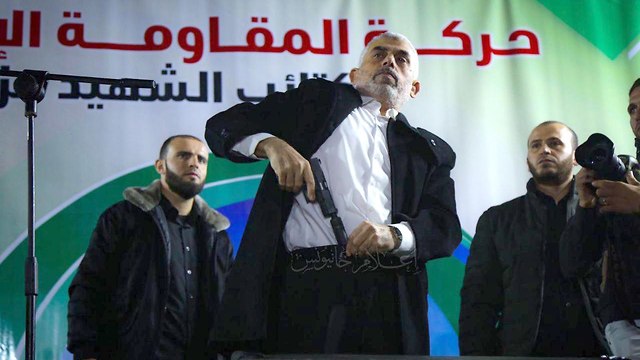Approximately two weeks ago, Yahya Sinwar, the leader of Hamas, returned to the international headlines when he was linked to the deadly surprise attack carried out by the al-Qassam Brigades, Hamas's military wing, on Israel townships surrounding Gaza on the morning of Saturday, October 7.
Sinwar, born in 1962 in a refugee camp near Khan Yunis within the Egyptian-administered Gaza Strip, emerged as a Palestinian activist at an early age. He had close ties to the founder of Hamas, Sheikh Ahmed Yassin, was killed during an Israeli assassination operation within Gaza in 2004. Sinwar pursued his education at the Islamic University in Gaza, graduating with a bachelor's degree in Arabic studies.
Yahya Sinwar knows how to choose his targets. weak, unarmed who cannot resist. coward.#October7massacre pic.twitter.com/ATrA0wBsm6
— נועה מגיד | noa magid (@NoaMagid) October 28, 2023
During the late 1980s, as Hamas transitioned from a religious movement to an armed terrorist organization amid the First Intifada, Sinwar played a pivotal role. He spearheaded efforts to establish a military wing and founded an internal security unit aimed at identifying and executing Palestinians collaborating with Israel. His cold-blooded approach along with the fact he would often personally particpate in the killings of fellow Palestinians gave him the infamous title "The Butcher of Khan Yunis."
In 1988, Sinwar was apprehended and subsequently convicted for the murder of Palestinians who had collaborated with Israel, resulting in four life sentences. Surprisingly, during his incarceration in Israeli prisons, Sinwar managed to foster positive relationships with Israeli security personnel. He spent countless hours engaging in conversations with Israeli inmates, delving into the intricacies of Israeli culture, and developing a peculiar fascination with Israeli television. These activities allowed him not only to become fluent in Hebrew but also to gain a profound understanding of Israeli politics and cultural developments.
מנהיגי חמאס ובראשם יחיא סינוואר יושבים במחבוא שלהם ועוקבים מקרוב אחרי ערוצי הטלוויזיה בישראל, אז העברתי להם מסר ישיר בערבית... pic.twitter.com/J6FNeStZSa
— יוסף חדאד - Yoseph Haddad (@YosephHaddad) October 22, 2023
At some point during his imprisonment, Sinwar faced a daunting medical challenge when diagnosed with a rare and aggressive brain tumor. Remarkably, he was transferred to an Israeli hospital for life-saving surgery. Throughout his time in prison, Sinwar's influence within the Hamas organization continued to grow. He maintained communication with the outside world through numerous visitors, including interviews with Israeli media on multiple occasions.
On June 25, 2006, a Hamas terrorist unit infiltrated Israeli territory, abducting Gilad Shalit, then an IDF soldier. Shalit's release occurred five years and four months later, in 2011, as part of a prisoner exchange deal that included the release of 1,027 security prisoners, among them Yahya Sinwar. Following his release, Sinwar rapidly ascended within the Hamas government in Gaza, ultimately winning an internal election in 2017 to become the leader of Hamas in the Gaza Strip.
Yahya Sinwar, Mohammed Deif, Saleh al-Arouri, Ismail Haniyeh and others have the blood of thousands on their hands.
— Israel Defense Forces (@IDF) October 24, 2023
We will never forget the Hamas massacre on October 7. pic.twitter.com/yzH9kZTCj3
Since the bloody terrorist attack by Hamas on October 7th, the IDF spokesman has unequivocally designated Sinwar as a "dead man," along with Muhammad Al-Deif, the leader of the Al-Qassam Brigades. They are accused of masterminding the attack that led to the tragic loss of more than 1,400 lives and the kidnapping of approximately 224 individuals. The IDF is actively pursuing Sinwar, who is believed to be hiding within the intricate network of tunnels used by the Al-Qassam Brigades in Gaza.


